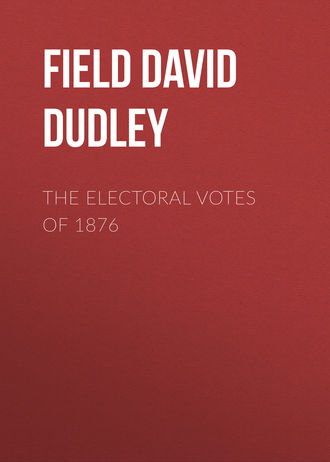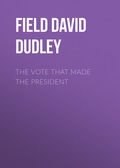
Field David Dudley
The Electoral Votes of 1876
THE ELECTORAL VOTES OF 1876
Who should Count them,
What should be Counted, and
The Remedy for a Wrong Count.
The electoral votes of 1876 have been cast. The certificates are now in Washington, or on their way thither, to be kept by the President of the Senate until their seals are broken in February. The certificates and the votes of thirty-four of the States are undisputed. The remaining four are debatable, and questions respecting them have arisen, upon the decision of which depends the election of the incoming President. These questions are: Who are to count the votes; what votes are to be counted; and what is the remedy for a wrong count? I hope not to be charged with presumption if, in fulfilling my duty as a citizen, I do what I can toward the answering of these questions aright; and, though I happen to contribute nothing toward satisfactory answers, I shall be excused for making the effort.
The questions themselves have no relation to the relative merits of the two candidates. Like other voters, I expressed my own preference on the morning of the election. That duty is discharged; another duty supervenes, which is, to take care that my vote is counted and allowed its due place in the summary of the votes. Otherwise the voting performance becomes ridiculous, and the voter deserves to be laughed at for his pains. His duty – to cast his vote according to his conscience – was clear; it is no less his duty to make the vote felt, along with other like votes, according to the laws.
The whole duty of a citizen is not ended when his vote is delivered; there remains the obligation to watch it until it is duly weighed, in adjusting the preponderance of the general choice. Whatever may be the ultimate result of the count, whether his candidate will have lost or won, is of no importance compared with the maintenance of justice and the supremacy of law over the preferences and passions of men.
It concerns the honor of the nation that fraud shall not prevail or have a chance of prevailing. If a fraudulent count is possible, it is of little consequence how my vote or the votes of others be cast; for the supreme will is not that of the honest voter, but of the dishonest counter; and, when fraud succeeds, or is commonly thought to have succeeded, the public conscience, shocked at first, becomes weakened by acquiescence; and vice, found to be profitable, soon comes to be triumphant. It is of immeasurable importance, therefore, that we should not only compose the differences that, unfortunately, have arisen, but compose them upon a basis right in itself and appearing to be right also.
Who should count the Votes?
This is the first question. What is meant by counting? In one sense, it is only enumeration, an arithmetical operation, which in the present instance consists of addition and subtraction. In another sense it involves segregation, separation of the false from the true. If a hundred coins are thrown upon a banker's counter, and his clerk is told to count the good ones, he has both to select and to enumerate. He takes such as he finds sufficient in metal and weight, and rejects the light and counterfeit. So when the Constitution ordains that "the votes shall then be counted," it means that the true ones shall be counted, which involves the separation of the true from the false, if there be present both false and true. In regard to the agency by which this double process is to be performed, the words of the Constitution are few: "The President of the Senate shall, in the presence of the Senate and House of Representatives, open all the certificates, and the votes shall then be counted." What would one take to be the meaning of these words, reading them for the first time? It is, that somebody besides the President of the Senate is to count, because, if he was to be the counting officer, the language would naturally have been that the President of the Senate shall open all the certificates and count the votes. There must have been a reason for this change of phraseology. It should seem to follow, from these words alone, that, whoever is to count, it is not the President of the Senate. It should seem also to follow, that the counting is to be done, not in the presence of Senators and Representatives as individuals, but in the presence of the two Houses as organized bodies. If their attendance as spectators merely was intended, the expression would naturally have been, in the presence of the Senators and Representatives or so many of them as may choose to attend. The presence of the Senate and House means their presence as the two Houses of Congress, with a quorum of each, in the plenitude of their power, as the coördinate branches of the legislative department of the Government. And inasmuch as no authorities are required to be present other than the President of the Senate and the two Houses, if the former is not to count the votes, the two Houses must.
The meaning which is thus supposed to be the natural one has been sanctioned by the legislative and executive departments of the Government, and established by a usage, virtually unbroken, from the foundation of the Government to the present year.
The exhaustive publication on the Presidential Counts, just made by the Messrs. Appleton, leaves little to be said on this head.
The sole exception suggested, in respect to the usage, is the resolution of 1789, but that is not really an exception. We have not the text of the resolution. We know, however, that there was nothing to be done but adding a few figures. There was no dispute about a single vote, as all the world knew. But taking the resolution to have been what the references to it in the proceedings of the two Houses would imply, it meant only that a President should be chosen for that occasion only. The purpose was not to define the functions of any officer or body, but to go through the ceremony of announcing what was already known, and to set the government going. No decisions between existing parties were to be made; no selection of true votes from false votes, but only an addition of numbers. Individual members of Congress have undoubtedly in a few instances expressed different views, but these members have been few, and they have always been in a hopeless minority. If any one can read the debates, the bills passed at different times through one House or the other, the joint resolutions adopted, and the accounts of the votes from time to time received or rejected, and doubt that the two Houses of Congress have asserted and maintained, from 1793 until now, their right to accept or reject the votes of States, and of individual electors of States, all that I can say is, that he must have a marvelous capacity of doubting. He must ignore uniform practice as an exponent of constitutions, and set up his individual misreading of words, reasonably plain in themselves, against the opinions of almost all who have gone before him.
The joint resolution of 1865 is of itself decisive, if a solemn determination of the two Houses of Congress, approved by the President, can decide anything. That resolution was in these words:
"Whereas, The inhabitants and local authorities of the States of Virginia, North Carolina, South Carolina, Georgia, Florida, Alabama, Mississippi, Louisiana, Texas, Arkansas, and Tennessee, rebelled against the Government of the United States, and were in such condition on the 8th day of November, 1864, that no valid election of electors for President and Vice-President of the United States, according to the Constitution and laws thereof, was held therein on said day: therefore —
"Be it resolved, by the Senate and House of Representatives of the United States of America, in Congress assembled, That the States mentioned in the preamble to this joint resolution are not entitled to representation in the electoral college for the choice of President and Vice-President of the United States for the term commencing on the 4th day of March, 1864, and no electoral votes shall be received or counted from said States, concerning the choice of President and Vice-President for said term of office."
In approving this resolution President Lincoln accompanied it with the following message, parts of which I will italicize:



